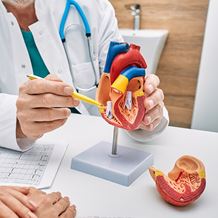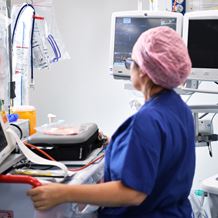
- Home
- Services
- Cardiac Services
- Procedures and Treatments
- Heart Transplant Surgery
What is heart transplant surgery?
Heart transplant surgery is a medical procedure to replace a diseased heart with a healthy donor’s heart. The very first Australian heart transplant was performed at St Vincent’s Hospital, Sydney in 1968. Heart transplant surgery is typically performed on patients diagnosed with end stage heart failure, when all other treatment pathways are no longer effective. Some conditions that eventually may require a heart transplant include coronary heart disease, cardiomyopathy and congenital heart disease. If you meet the specific criteria for heart transplant surgery, you will be placed on a waiting list for the next available donor heart. The donor heart comes from someone who has recently passed away, and whose family have agreed to donate their heart.
What does it do?
Heart transplant surgery is an established medical procedure for advanced heart disease. It is suitable for patients who are no longer benefitting from heart treatment and are likely to die without the surgery. Most people experience a significant improvement in symptoms for many years.
- The benefits of heart transplant surgery include:
- Longer lifespan
- A better quality of life
- Increased energy
As it is a major operation, it does carry a set of risks and potential complications that include:
- Donor heart rejection
- Risk of infection
- Kidney problems
- High blood pressure
- Diabetes
- Risk of some type of cancer
How does it work?
In order to be eligible for heart transplant surgery, patients must meet a suitability criteria. All other organs need to be working normally, patients should be non-smokers and are advised to avoid alcohol, and there should be a genuine commitment to taking care of the new heart. If your doctor thinks you may be a suitable candidate, your name will join a waiting list. When a heart becomes available, the patient considered in most need will be contacted immediately to see if there is a match.
Why is it performed?
If your heart is severely damaged and is no longer responding to any treatment, this is known as end stage heart failure. This condition causes symptoms such as chest pain, fatigue, breathlessness and swelling. Whilst your heart is not about to stop, it means your heart is no longer working effectively, and this can limit your ability to perform simple daily tasks. If your doctor considers you eligible for heart transplant surgery, your medical team will help you understand how the procedure works and what is involved.
Procedure
Heart transplant surgery is performed under general anaesthetic, and you will be given medications to help you relax and fall asleep for the duration of the surgery. Your doctor will make an incision down the centre of your chest before connecting you to a special type of heart-lung bypass machine. This keeps the blood pumping through your body while the heart operation proceeds. The diseased heart is carefully detached and removed, and the donor heart is sewn into place. All major blood vessels are then attached to the new heart. If the new heart does not automatically start beating, an electric shock can be used to get it started. Medication is given to prevent the body from rejecting the new heart. Heart transplant surgery can take up to six hours.
Recovery
After surgery, you will be kept in hospital for up to three weeks with regular checks including blood tests, chest X-rays, and ECGs (electrocardiograms). Regular heart biopsies are required for three months after heart transplant surgery to identify whether your immune system has accepted the new heart. You will be given detailed information about your recovery including how to manage the medications, returning to exercise, and what to look out for. Following the rehabilitation process as set out by your medical team is key to making a return to a good quality of life. Learn about Heart Transplant Surgery Recovery.
What's next?
If you have been experiencing heart-related symptoms, book an appointment with our cardiac services specialist today.
Our specialists in Cardiac Services
View all specialists





